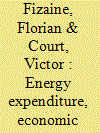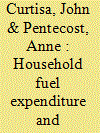| Srl | Item |
| 1 |
ID:
186427


|
|
|
|
|
| Summary/Abstract |
This paper uses household survey data from Australia to investigate whether renters face larger energy bills than otherwise similar households. We find that a negative unconditional effect of renting on residential electricity expenditure becomes positive when controlling for log net wealth, with renters on average spending about 8% more than otherwise similar households. This is a larger effect than in most prior studies. The effect operates via higher usage quantities rather than higher average prices, and a similar effect is found for overall residential energy expenditure including natural gas. Central to the story is that renters tend to have lower net wealth, and net wealth is associated with higher energy use due to reasons including additional appliance ownership. This makes net wealth an important control. The findings cast light on the potential for more ambitious policy responses to reduce energy-related disadvantages faced by renters in Australia. There is also scope for further research into whether similarly large effects are evident in other countries.
|
|
|
|
|
|
|
|
|
|
|
|
|
|
|
|
| 2 |
ID:
137776


|
|
|
| 3 |
ID:
150735


|
|
|
|
|
| Summary/Abstract |
We estimate energy expenditure for the US and world economies from 1850 to 2012. Periods of high energy expenditure relative to GDP (from 1850 to 1945), or spikes (1973–74 and 1978–79) are associated with low economic growth rates, and periods of low or falling energy expenditure are associated with high and rising economic growth rates (e.g. 1945–1973). Over the period 1960–2010 for which we have continuous year-to-year data for control variables (capital formation, population, and unemployment rate) we estimate that, statistically, in order to enjoy positive growth, the US economy cannot afford to spend more than 11% of its GDP on energy. Given the current energy intensity of the US economy, this translates in a minimum societal EROI of approximately 11:1 (or a maximum tolerable average price of energy of twice the current level). Granger tests consistently reveal a one way causality running from the level of energy expenditure (as a fraction of GDP) to economic growth in the US between 1960 and 2010. A coherent economic policy should be founded on improving net energy efficiency. This would yield a “double dividend”: increased societal EROI (through decreased energy intensity of capital investment), and decreased sensitivity to energy price volatility.
|
|
|
|
|
|
|
|
|
|
|
|
|
|
|
|
| 4 |
ID:
137661


|
|
|
|
|
| Summary/Abstract |
This paper examines the relationship between residential buildings׳ energy efficiency labels and household energy expenditure, complementing an existing literature comparing theoretical and actual energy use. Residential building energy performance certificates indicate a theoretical energy use based on standardised assumptions about occupancy and energy service demand and are a market signal about the energy performance of a property. This paper quantifies the empirical relationship between households’ expenditure on fuel and building energy performance using household expenditure survey data from the Republic of Ireland. The extent of this relationship, i.e. the size of the elasticity parameter, is of direct relevance to policy makers in the context of energy efficiency and climate policy targets. With building energy efficiency measured as a 15-point scale, we find that each rating decline along the scale is associated with a reduction in energy expenditure of 1.6%.
|
|
|
|
|
|
|
|
|
|
|
|
|
|
|
|
| 5 |
ID:
091700


|
|
|
|
|
| Publication |
2009.
|
| Summary/Abstract |
Solar thermal technologies offer the potential to meet a substantial share of residential water and space heating needs in the EU, but current levels of adoption are low. This paper uses data from a large sample of German households to assess the effects of geographic, residence, and household characteristics on the adoption of solar thermal water and space heating technologies. In addition, the impact of solar thermal technology adoption on household energy expenditures is estimated after controlling for observed household heterogeneity in geographic, residential, and household characteristics. While evidence is found of moderate household energy expenditure savings from combined solar water and space heating systems, the findings generally confirm that low in-home energy cost savings and fixed housing stocks limit the diffusion of residential solar thermal technologies. Little evidence is found of differential adoption by distinct socio-economic groups.
|
|
|
|
|
|
|
|
|
|
|
|
|
|
|
|